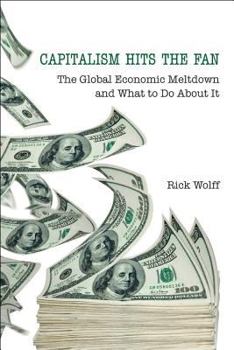Capitalism Hits the Fan: The Global Economic Meltdown and What to Do about It
Select Format
Select Condition 
Book Overview
This title chronicles one economist's growing alarm and insights as he watched, from 2005 onwards, the economic crisis build, burst, and then dominate world events. The book's essays engage the public discussion about basic structural changes and systemic alternatives needed to fix today's broken economy.
Format:Paperback
Language:English
ISBN:156656784X
ISBN13:9781566567848
Release Date:October 2009
Publisher:Olive Branch Press
Length:256 Pages
Weight:1.04 lbs.
Dimensions:0.7" x 5.9" x 8.9"
Customer Reviews
3 ratings
Capitalism needs a bit of maintenance now and again
Published by Thriftbooks.com User , 14 years ago
Capitalism needs a bit of maintenance now and again. "Capitalism Hits the Fan: The Global Economic Meltdown and What to Do About it" discusses the recent financial crises which have turned into depression. Richard D. Wolff offers his own thoughts and ideas on how to combat these recent troubles with original and well thought out solutions. With scholarly thought and research, those pondering a way out of the crisis, "Capitalism Hits the Fan" is a worthy read for those who often put thought into the country's economic problems.
An Important Perspective
Published by Thriftbooks.com User , 14 years ago
In this collection of startlingly prescient short essays from 2005 to 2009, Richard D, Wolff presents an analysis of the current economic disaster all too rarely encountered. In each of the book's three chronologically arranged sections - roots, economics, and politics of the economic crisis - he amply demonstrates how, through the decades, capitalism has oscillated from stability to meltdown to recovery and back. Increasingly, Wolff points out, it has been the workers who have borne the great burden of corrective or "recovery." For this, he levels strong criticism at both the right (Republicans) and the "mainstream" left (Democrats, Krugman, Stiglitz, et. al.). Using clearly reasoned arguments and detailed evidence, he concludes that unless capitalism undergoes profoundly radical structural change, we are doomed to endlessly repeat the cycle that produces these crises. At times, Wolff, a professor of economics at the University of Massachusetts, Amherst, evinces a sour grapes attitude about what he sees as the difficulty of his like-minded colleagues to land plum academic positions. This, he believes, is a major reason the economic debate gets mired in oscillation mode. One look at Obama's staff of economic advisors strongly suggest he has a point. The only quibble I have with this significant book is that there is a certain repetitiveness to the essays. However, given the import and freshness of its ideas, perhaps repetition is a good thing here.
The Truth.
Published by Thriftbooks.com User , 15 years ago
The current global financial crisis is not due to new problems nor was it unexpected. As "Capitalism Hits the Fan" illustrates it's simply the most recent downturn of the disaster prone free-market system. As far back as 2005 University of Massachusetts economist Richard Wolff, was sensing this coming downfall of the markets. Instead of taking the liberal approach (blaming government deregulation and a handful of corrupt corporations) or the conservative approach (blaming over-regulation) he targets what mainstream politicians don't dare to target: capitalism itself. Capitalism has seen two major downfalls in the past 75 years and has been heavily peppered with slightly less painful contractions in that same time period. Many students of economics would simply brush this off as the inevitable consequences of the business cycle that accompanies the capitalist system. Such an explanation might suffice if it wasn't for the all out attack on workers that can't be attributed to the cycle. Dr. Wolff explains what many right and left-wing economist have been screaming for years but, without truly considering the consequences. Americans are working longer hours (the most in the industrialized world) more productively (with a 75%+ increase of productivity in the past 30 years) for ever falling wages. The most noted effect of such a trend is the pendulum swing between FDR style "New Deal" policies and Regan-Bush style financial deregulation. When one style of capitalism fails, the voters flood to the other style in hopes of rejuvenated prosperity. However, as Wolff explains, regardless of where the pendulum swings both styles of capitalism are met with disastrous consequences for American citizens. Wolff also demonstrates how social democratic policies leave the wealthy with the incentive and the tools to dismantle social programs and sidestep government regulations thus enthroning "laissez-faire" once again. The author then gives us a history of American industry in terms of wages. For 150 years wages rose with productivity. In the late 70's that trend came to a halt as worker's real-wages flat lined (as union membership declined and free-trade kicked into hyper speed). Industry then substituted lost wages with a wide range of loans to compensate. The loans were not taken due to a lack of "personal accountability" as many claim, but out of a desire to sustain pre-70's consumption. Wolff uses statistics to show the skyrocketing in the cost of living (like college expenses) in this time period, thus necessitating borrowed capital. Capital that of course must be paid with interest, effectively costing Americans twice: once for lost wages and again for interest payments. The results have been mass wealth redistribution from the bottom to the top. Wolff offers all the statistics to show the steady loss of ground for the working and middles classes. Comparing data from 1967 and 2001 brings startling facts to light."According to the US Census Bureau.....the






